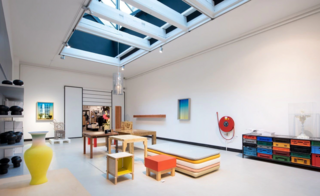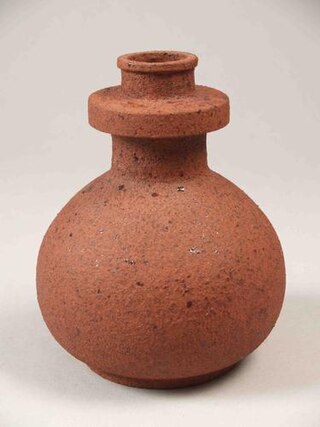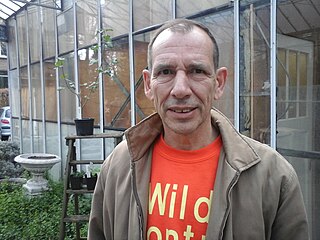
NRC, previously called NRC Handelsblad, is a daily morning newspaper published in the Netherlands by NRC Media. It is generally accepted as a newspaper of record in the Netherlands.

Droog is a conceptual Dutch design company situated in Amsterdam, Netherlands. Droog has realised products, projects, exhibitions and events. Droog is an internationally renowned design label [1] and one of the most famous exponents of Dutch Design. Droog worked with well known designers such as Marcel Wanders, Hella Jongerius, Tejo Remy, Richard Hutten, Ed Annink, Jurgen Bey and Joris Laarman.

The Netherlands Architecture Institute (NAI) was a cultural institute for architecture and urban development, which comprised a museum, an archive plus library and a platform for lectures and debates. The NAI was established in 1988 and was based in Rotterdam since 1993. It ceased to exist in 2013, when it became part of Het Nieuwe Instituut.

Harm Henrick Kamerlingh Onnes was a Dutch portrait painter and ceramist, who also produced designs for stamps and stained-glass windows. He is best known for the small, humorous vignettes of everyday life.

Gijs Bakker is a Dutch jewellery and industrial-designer, educated at the Gerrit Rietveld Academie in Amsterdam, the Netherlands and the Konstfackskolan in Stockholm, Sweden.
Jacobus Ruurd "Jaap" Bruijn, was a Dutch maritime historian. He was professor of maritime history at the University of Leiden from 1979 until his retirement in 2003. During his 41-year teaching career as The Netherlands' only university professor of maritime history, he guided the doctoral theses of at least 49 graduate students.

Jan de Rooden was a Dutch ceramist and sculptor, who worked in Nijmegen, Paris, and Amsterdam.

Hans de Jong was a Dutch sculptor, designer and ceramist.
Theodorus Antonius Hubertus Maria (Theo) Dobbelman was a Dutch sculptor, ceramist and painter.

Dora Dolz de Herman was a Spanish-Dutch artist, best known for her outdoor ceramic works in the form of chairs and sofas.

Johan Gerard van Loon was a Dutch ceramist and textile artist.

Renny Ramakers is a Dutch art historian, curator, design critic, and co-founder and director of the Droog design foundation. Ramakers writes articles, gives lectures, initiates projects and curates exhibitions in the field of art and design. In 2007 she was awarded the Benno Premsela Prize, in 2019 the IJprijs for her cultural contribution to the city of Amsterdam, and in 2018 she received a Dutch Royal Award for her work in the field of Dutch Design.
The Benno Premsela Prize is a former Dutch design prize, awarded every two years from 2000 to 2012 by the Mondriaan Fonds to a person who has played a stimulating role in the field of visual arts, design or architecture. The prize is named after designer Benno Premsela, who died in 1997, and who himself had played a central role in post-war Dutch art and design. The prize consisted of a sum of money of 40,000 euros.

Bernardus Stefanus Henricus (Ben) Zegers is a Dutch visual artist, active as a sculptor and installation artist, and teacher and coordinator at the Gerrit Rietveld Academy.

The Dutch Furniture Awards is a former annual furniture design competition in the Netherlands, organized from 1985 to 1998. This was an initiative of the Jaarbeurs Utrecht and the Vereniging van Vakbeurs Meubel (VVM).
Gert Staal (1956) is a Dutch researcher, publicist and critic in the fields of design, architecture and urban design. Educated as linguist and art historian over the years he was active as journalist, editor, author, manager and teacher particularly in those fields of Dutch design.
The Premsela Dutch Platform for Design and Fashion was a Dutch institute for the promotion of design and fashion in the Netherlands from 2002 to 2013.
Christine de Baan is a Dutch art curator, policy advisor and director, known for numerous contributions in the field of Dutch Design. She participated in the organisation of the Prix de Rome, the Rotterdamse Kunststichting where she was founding director of the Rotterdam Design Award in 1993, the Fonds BKVB, and the International Architecture Biennal Rotterdam.
Thimo te Duits is a Dutch art historian, curator, author and editor, known for his numerous contributions in the field of Dutch applied art.

Margaretha Wilhelmina Francina (Mienke) Simon Thomas is a Dutch art historian, curator and author, working as a senior curator at Museum Boijmans Van Beuningen in Rotterdam. She is known for her works on the development of Dutch applied art and design.














